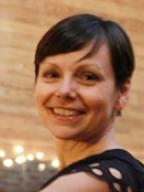
Biography
Education
- Ph.D. in Sociology from UCLA, 2006.
- Masters in Sociology from Syracuse University, 1997.
- B.A./B.S. in Sociology from University of Wisconsin, Oshkosh, 1995.
- Specialty Areas: Gender, Work and Organizations, Labor Studies, Ethnography, Social Psychology
Courses Taught
- SOC 202 Sociological Analysis
- SOC 324 Sociology of Sex Roles
- SOC 340 Sociology of Work
- SOC 345 Social Psychology
- SOC 482SOC Practicum in Work and Society
- SOC 498AEE The Sociological Experience
- SOC 524 Dynamics of Sex and Gender
- SOC 691A Field Research
Selected Publications and Presentations
Denissen, Amy M. and Abigail C. Saguy. 2014. "Gendered Homophobia and the Contradictions of Workplace Discrimination for Women in the Building Trades." Gender & Society 28(3): 381-403.
David Boyns, Amy Denissen, and Alexandra Gerbasi. 2011. “Economic Crisis and the California State Public University: The Institutional, Professional and Personal Effects on Faculty and Students.” In The CSU Crisis and California’s Future series by the UCLA Civil Rights Project.
Denissen, Amy M. 2010. “Crossing the Line: How Women in the Building Trades Interpret and Respond to Sexual Conduct at Work.” Journal of Contemporary Ethnography 39: 297-327.
Denissen, Amy M. 2010. “The Right Tools for the Job: Constructing Gender Meanings and Identities in the Male-Dominated Building Trades.” Human Relations 63(7): 1051-1069.
Denissen, Amy M. and Anita Yuan. 2008. “Construction Apprenticeship Training in Los Angeles: Evidence for Progress in a Changing Economy.” Report for the City of Los Angeles Labor Committee on Construction Opportunity.
Denissen, Amy M. 2006. Perpetual Pioneers: Women and Work in the Construction Trades. 2006. Dissertation.
Research and Interests
To understand problems such as discrimination and segregation in work settings, it is important to examine the micropolitics whereby personal and social troubles are defined, mobilized, and resisted as inequalities. My research first explored this process in gender and racial-ethnic atypical work settings where the presence of “outsiders” made the normative (and, thus, often hidden) practices of gender and sexual inequality more visible. For example, in “Crossing the Line” I show how unwanted sexual conduct comes to be defined as sexual harassment and how this results, in part, from a lack of interactional and institutional support for tradeswomen’s non-punitive remedial efforts. Similarly, “The Right Tools” focuses on women’s marginalization in the building trades, showing how gender is both a “tool” for excluding women and a tool of resistance in the form of reflexive gender displays that exploit contradictory expectations inherent in dualistic gender orders (or gender schemas). This work contributes to research on the significance of informal practices in the reproduction of workplace inequalities as well as in the possibilities for change.
Currently, I’m exploring similar issues in a paper (with Abigail Saguy, UCLA) that examines the mechanisms of sexist and homophobic workplace discrimination through the experiences of lesbian tradeswomen. My current research also expands into new occupational and international contexts including troubles in an educational work setting (a study of the budget cuts at CSUN with David Boyns and Alexandra Gerbasi) and a comparative analysis of state agency responses to sex trafficking in Los Angeles and Lisbon (with Ana Prata).
